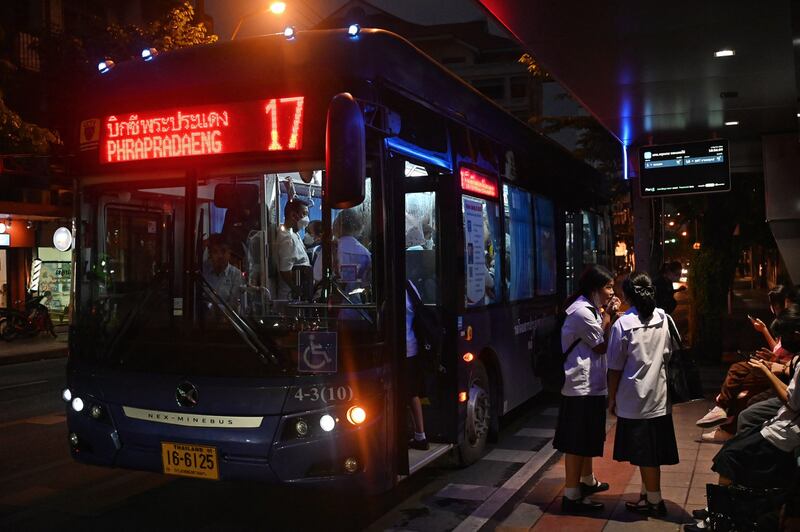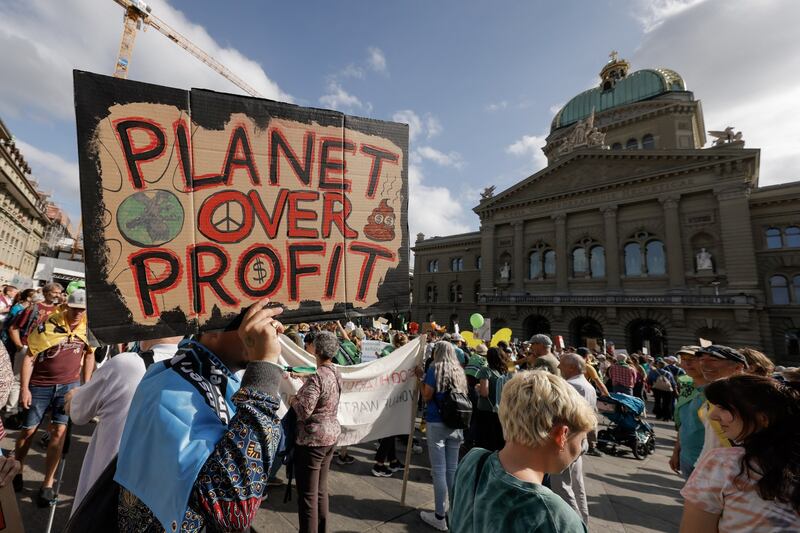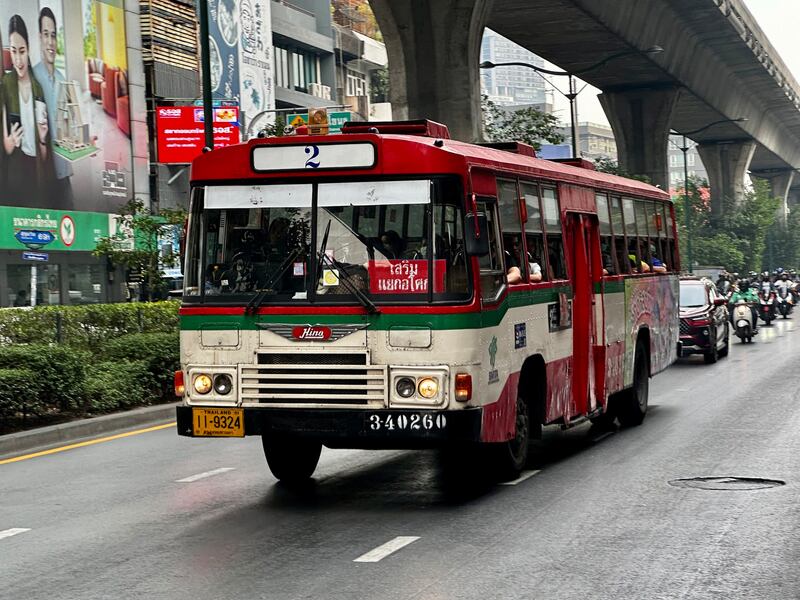UPDATED at 06:50 A.M. ET on 01-31-2024
In Bangkok, known for its heavy traffic, pollution, and aging buses, a major Thai public limited firm Energy Absolute, or EA, is transforming public transport through the Bangkok E-Bus program.
This groundbreaking initiative aims to replace old diesel buses with eco-friendly electric models, generating carbon credits for sale. Since 2022, EA has already deployed 3,000 such buses, marking a significant environmental leap in the city.
The effort is part of a historic agreement between Thailand and Switzerland, Asia’s first transfer involving Internationally Transferable Mitigation Outcomes, or ITMOs, for a country to achieve Nationally Determined Contributions under the Paris Agreement’s Article 6.2. This mechanism facilitates countries to trade carbon emission reductions to achieve national climate targets.
The Thai-Swiss cooperation, a cautious yet vital step in utilizing the voluntary carbon transaction between governments for climate goals, has set a precedent in Southeast Asia. Nine other countries in the region have followed suit, signing different types of agreements to benefit from this innovative approach.
Supporting this endeavor is the KliK Foundation, a private entity established to fulfill the legal compensation obligation of Swiss motor fuel importers. It has provided crucial financial backing, primarily through purchasing ITMOs through climate-friendly initiatives.
“The Thai-Swiss ITMO transaction is a trailblazer,” Axel Michaelowa, a climate policy and carbon credit mechanism expert, told Radio Free Asia.
The actual amount of money has not been made public, but KliK and EA announced on Jan. 8 that the Swiss bought 1,960 ITMOs from the project.
Each represents one metric ton of carbon dioxide equivalent (CO2e) reduced or removed from the atmosphere.
An executive at EA said the value is more than US$30 per credit but did not give an exact figure. There is no market rate, and the government does not set the price.
KliK plans to purchase at least 0.5 million ITMOs by 2030. EA plans to launch at least 4,000 electric buses in Bangkok.

The purchase of ITMOs, in Thailand and 12 other countries, is part of Switzerland’s climate strategy, particularly in meeting its obligations under its CO2 law and its commitments to the Paris Agreement. It aims to halve emissions by 2030 and reach net zero by 2050.
The ITMOs are now credited to KliK’s account, while Thailand will deduct them from its newly formed carbon inventory to avoid double counting.
Although groundbreaking, the process is fraught with complexity, opaqueness, and a lack of regulation, underscoring nations’ difficulties maneuvering through the intricate and sometimes disputed realm of global climate agreements.
What is ITMO, and how does it work?
ITMOs work by allowing countries to trade emission reductions in the form of carbon credit to help meet their climate targets.
For example, if Country A exceeds its emission reduction targets, it can sell the surplus to Country B, struggling to meet its targets.
This trade, recorded as ITMOs, helps Country B fulfill its commitments under the Paris Agreement while incentivizing Country A’s continued environmental efforts, even though the latter cannot count it as progress towards its climate goal.
Since it is a country-to-country agreement, both must authorize it.
“It’s a purely commercial contract between the implementer of the program and us as buyers of the credits. It’s individual negotiation specific for each and every program,” Marco Berg, the managing director of KliK Foundation, told RFA.
He said it depends on what a country wants out of the project, among other things, with “the methodology behind it, the environmental integrity, and contribution to sustainable development” scrutinized before the project is implemented.
ITMOs are taking place in “addition to what Switzerland is doing nationally, not in place of an emission reduction,” he added.

Detractors of the mechanism question the effectiveness and equity of relying on market-based solutions for proper climate action, saying it could delay eradicating emissions.
Some say rich nations are shifting responsibility to the Global South. There are also concerns that such deals might fund projects in poorer countries that would have proceeded regardless of foreign investment, potentially lacking additional environmental impact.
The regulations and international institutions governing ITMO trade do not exist yet.
Berg also noted challenges, including regulatory uncertainty affecting business risks and the need for capacity building, complicated by changing political landscapes.
Negotiations over the carbon market at the Dubai COP28 climate summit in December came to a standstill after intense discussions with governments over the transparency issue. Other stumbling blocks were whether to have national or international registries to record the transactions, as well as defining what constitutes a carbon credit and whether emissions avoidance, like conserving already existing forests, should be included.
"At this point, A6.2 seems to be a complex international banking system with private accounts, units [like money] with changing values, trades of these units, and nontransparent reports," Heinrich Boll Stiftung, a German think-tank, wrote earlier this month.
Carbon trading has become “a way to make money and generate finance, rather than being a system to ratchet down emissions,” it said. “The dependency on this climate finance via carbon trading is a dependency on fossil fuel pollution.”
In defense of ITMOs
“Cooperative approaches under Article 6.2 are fully operational,” opined Michaelowa, the senior founding partner at Perspectives, a Swiss climate research group.
“The failure of negotiations on Article 6 at COP28 does not prevent countries from engaging in Article 6.2 collaboration and trade of ITMOs,” he said.
Energy Absolute contends it would not have been able to roll out the e-bus so swiftly, even though it had already planned for the project, without support from KliK.
“Basically, the investment cost per bus for the e-bus is a little bit higher. That’s why we try to get financial support, and luckily, we found the KliK Foundation and the Swiss government, thank God,” said Chatrapon Sripratum, a senior executive overseeing the project.
“We are pioneers. This market will really boom in the future.”
Even though diesel buses contribute to Bangkok’s already bad air, the Thai government does not have any subsidy program for private investors.
“Making e-buses commercially viable is a high-quality project activity that generates significant co-benefits for citizens in Bangkok due to the reduction of local air pollution,” said Michaelowa.
“The criticism by Swiss NGOs that the project does not fulfill the additionality criterion [that such a climate project would have happened without the funding] is unjustified because electric buses clearly have higher costs than conventional diesel buses.”

However, the Bangkok e-bus project is still mired in an opaque deal, including the rate of the ITMOs and the way carbon credit is calculated from bus emission reductions.
As of Jan. 9, there were 78 bilateral agreements at different levels of readiness for implementation under Article 6.2 between eight different buying countries and 46 selling countries, according to the United Nations Environment Program. Most of them are in the preliminary phase.
Japan and Singapore have signed deals to buy ITMOs from five Southeast Asian countries, including Cambodia, Indonesia, Laos, Thailand, and Vietnam.
Japan has also signed a deal with Myanmar and the Philippines, while South Korea has agreed to purchase from Vietnam and Laos. Norway is also buying from Indonesia.
Malaysia has not signed any deal for ITMOs.
Among the buyers, Singapore has already signed bilateral deals for carbon credit from 15 countries, including its Southeast Asian neighbors, and Bhutan and Papua New Guinea. Japan has signed with almost 30 countries, the highest among the eight buyers.
However, pursuing a standardized and transparent carbon trading system is made more complex by the speedy bilateral agreements between countries, which lack oversight and regulation.
Edited by Mike Firn and Taejun Kang.
Updated for clarification.
